初一英语上英语Unit6基础知识点练习
英语人教版七年级上册 Unit6_基础知识点训练

Unit 6 Do you like bananas?一、根据句意和首字母完成单词。
1.I have hamburgers for b___________.2. Here are some tomatoes. Do you like t _________?3. I like French f _________.4. I have an ice c_________.5. Children should (应当) eat lots of v___________.6. What do you have for d__________?7. Zhou Jielun is a singing s________.8. She eats h________ food every day.9. How m________ apples do you have?10. I’m going on a picnic with a group of f_________.二、单项选择题。
( )1. ________ you like ice cream?A. AreB. AmC. DoesD. Do( )2. ________ play table tennis.A. LetB. LetsC. Let’sD. It’s( )3. ________ does your father have ______ lunch? Chicken and tomatoes.A. What; forB. What; /C. How; forD. How; / ( )4. Oranges are a kind of ________.A. vegetablesB. vegetableC. fruitsD. fruit ( )5. What ______ Tom like _______ for breakfast?A. does; eatB. is; eatC.does; to eatD. is; to eat ( )6. –Do you like ice cream for ______ dessert?A. aB. theC. /D. an( )7. –Does your friend like salad?-- _________.A. Yes, she like.B. No, she does.C. Ye s, she doesn’tD. No, she doesn’t.( )8. I have a cat. It likes fish. It eats _______ every day.A. a lotB. manyC. Lots ofD. much( )9. –Does your English teacher sing very _____ ?--Yes, She does.A. goodB. niceC. greatD. well( )10. –Let’s _______ baseball.--OK. Let’s _______.A. play; goB. plays; goC. play; to goD. play; goes三、完形填空。
00-2019深圳牛津版英语七年级上Unit6知识点整理及练习
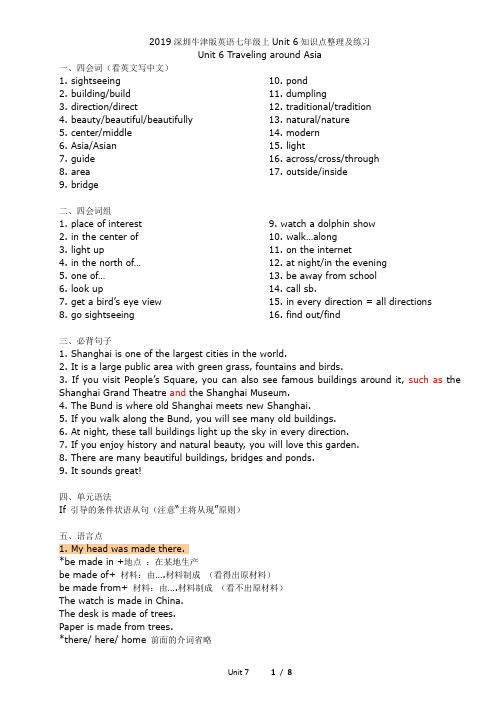
2019深圳牛津版英语七年级上Unit 6知识点整理及练习Unit 6 Traveling around Asia一、四会词(看英文写中文)1. sightseeing2. building/build3. direction/direct4. beauty/beautiful/beautifully5. center/middle6. Asia/Asian7. guide8. area9. bridge 10. pond11. dumpling12. traditional/tradition13. natural/nature14. modern15. light16. across/cross/through17. outside/inside二、四会词组1. place of interest2. in the center of3. light up4. in the north of…5. one of…6. look up7. get a bird’s eye view8. go sightseeing 9. watch a dolphin show10. walk…along11. on the internet12. at night/in the evening13. be away from school14. call sb.15. in every direction = all directions16. find out/find三、必背句子1. Shanghai is one of the largest cities in the world.2. It is a large public area with green grass, fountains and birds.3. If you visit People’s Square, you can also see famous buildings around it, such as the Shanghai Grand Theatre and the Shanghai Museum.4. The Bund is where old Shanghai meets new Shanghai.5. If you walk along the Bund, you will see many old buildings.6. At night, these tall buildings light up the sky in every direction.7. If you enjoy history and natural beauty, you will love this garden.8. There are many beautiful buildings, bridges and ponds.9. It sounds great!四、单元语法If 引导的条件状语从句(注意“主将从现”原则)五、语言点1. My head was made there.*be made in +地点:在某地生产be made of+ 材料:由….材料制成(看得出原材料)be made from+ 材料:由….材料制成(看不出原材料)The watch is made in China.The desk is made of trees.Paper is made from trees.*there/ here/ home 前面的介词省略2. Shanghai is one of the largest cities in the world★“one of the +形容词最高级+可数名词复数”表示“最….之一”eg: Beijing is one of the oldest cities in China.3. People’s Square is in the centre of Shanghai.★▲*in the centre of…….:在……的中间in the centre of……..与in the middle of…….的区别①centre 常指空间的中心,如圆,球体的“正中心”;学术,工业,商业的中心;eg: the centre of the ballLondon is one of the financial centre of the world.②middle 可用来指时间和活动eg: in the middle of Septemberin the middle of the meeting4. It is a large public area with green grass, fountains and birds.★*public: 公共的in public 在公共场合* area: n 区域,地区;面积eg: In some areas, the children walk to school.an area of 100 square meters 100 平方米的面积*with: 带有eg: I want to have a house with a beautiful garden.The teacher comes into the classroom with a book in his hand.5. The Pudong New area, just across the Huangpu River…..★▲*just: adv 正好,恰好,常用语肯定句eg: It’s just seven o’clock. That’s just what I want.*across: prep 在….对面eg: The Simths live just across the river.史密斯一家就住在河对面。
Unit 6 语法知识点练习2022-2023学年牛津译林版英语七年级上册
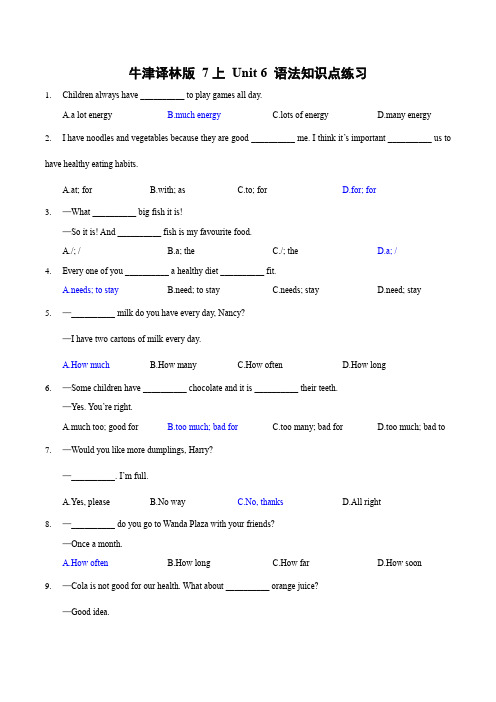
牛津译林版7上Unit 6 语法知识点练习1.Children always have __________ to play games all day.A.a lot energyB.much energyC.lots of energyD.many energy2.I have noodles and vegetables because they are good __________ me. I think it’s important __________ us to have healthy eating habits.A.at; forB.with; asC.to; forD.for; for3.—What __________ big fish it is!—So it is! And __________ fish is my favourite food.A./; /B.a; theC./; theD.a; /4.Every one of you __________ a healthy diet __________ fit.A.needs; to stayB.need; to stayC.needs; stayD.need; stay5.—__________ milk do you have every day, Nancy?—I have two cartons of milk every day.A.How muchB.How manyC.How oftenD.How long6.—Some children have __________ chocolate and it is __________ their teeth.—Yes. You’re right.A.much too; good forB.too much; bad forC.too many; bad forD.too much; bad to7.—Would you like more dumplings, Harry?—__________. I’m full.A.Yes, pleaseB.No wayC.No, thanksD.All right8.—__________ do you go to Wanda Plaza with your friends?—Once a month.A.How oftenB.How longC.How farD.How soon9.—Cola is not good for our health. What about __________ orange juice?—Good idea.A.someB.anyC.manyD.little10.Kitty is a __________ person, because she __________ exercises.A.health; neverB.health; seldomC.healthy; oftenD.healthy; never11.I do not eat sweet snacks __________ meals. They are unhealthy.A.onB.inC.ofD.between12.—What can I do for you, sir?—I’d like two __________. I like fruit.A.bowls of riceB.boxes of applesC.cartons of milkD.bottles of water13.—Come on, children! Help yourselves to some __________ if you like.—Thank you, Mum.A.fish and potatoB.fishes and potatoesC.fish and potatoesD.fishes and potato14.—Can I help you, madam?—Yes. __________, please.A.Two pair of socksB.Two pairs of socksC.Two pairs of sockD.Two pair of sock15.—How many __________ do you need?—Three.A.bag of riceB.bags of riceC.bags of ricesD.bag of rices16.Alan always buys two __________ and three __________ for his family on his way home.A.bread; lemonsB.tomatoes; lemonsC.tomatoes; orangeD.apple; fishes17.—Would you like __________ coffee?—No, thanks. I’ve drunk two __________.A.any; bottles of orange juiceB.little; bottle of oranges juiceC.some; bottles of orange juiceD.a few; bottle of orange juice18.Many snacks have __________ sugar in them and they are not __________ our health.A.too many; good forB.too much; bad forC.too much; good forD.too many; bad for19.Simon likes pears __________ apples, but he doesn’t like bananas __________ oranges.A.and; andB.or; orC.and; orD.or; and20.—Are you thirsty?—Yes. Please give me __________.A.three bottle waterB.three bottle of waterC.three bottles of waterD.three bottles of waters21.—Can I help you, madam?—Yes, I’d like some __________ and __________.A.tomatoes; potatosB.tomatoes; potatoesC.tomatos; potatoesD.tomatoes; potatos22.There are some __________ and __________ on the table.A.potatoes; teaB.chickens; sweetsC.tomatoes; porksD.tomatoes; milk23.—Would you like more dumplings, Harry?—__________. I’m full.A.Yes, pleaseB.No wayC.No, thanksD.All right24.How many __________ do they want?A.apple juiceB.glasses of apple juiceC.apple juiceD.glass of apple juice25.I’m hungry. But there isn’t any __________ left on the table. I have to buy some.A.sandwichesB.juiceC.breadD.water26.—A can of cola, please!—Only one left. Would you like to have __________, sir?A.itB.oneC.itsD./27.Taiji is my favourite and I often play it __________ healthy.A.to keepB.keepsC.keepingD.kept28.The fish __________ delicious. It’s not good for his health.A.tastesB.soundsC.looksD.feels29.It’s important for us __________ a healthy lifestyle.A.to keepB.keepC.keepingD.kept30.__________ is not good for your __________ to eat a lot of fast food.A.That; healthB.It; healthC.That; healthyD.It; healthy31.__________ is good for your __________.A.Do exercise; healthB.Doing exercise; healthyC.Doing exercise; healthD.Do exercise; healthy32.We often have three meals _________ day. And we usually have __________ breakfast at 8:00 every morning.A.a; theB.a; aC.a; /D./; the33.—__________ music do you listen ___________ every day?—Less than an hour.A.How many; toB.How much; /C.How long; toD.How much; to34.There isn’t __________ milk in the fridge. Would you like to buy __________?A.some; someB.any; someC.some; anyD.any; any35.Sandy is in bed. She needs more __________. You __________ wake her up now.A.sleeping; canB.sleep; can’tC.sleeps; canD.sleeps; can’t36.—__________ does your mother often go for a walk?—Every afternoon.A.How longB.How muchC.How oftenD.How many37.—Do you want __________ beef?—No, thanks, Mum.A.someB.anyC.a fewD.few38.“__________ apple a day keeps the doctor away.” is __________ useful saying.A.An; anB.An; aC.A; aD.A; an39.Uncle Li has a farm. There are some __________ on the farm.A.chicken and sheepB.chickens and sheepsC.chickens and sheepD.chicken and sheeps40.—Do you often eat noodles __________ dinner?—Yes. And we often watch TV __________ dinner.A.at; forB.for; atC.at; atD.for; for41.—Our school has fifty __________. What about your school?A.woman teacherB.women teachersC.women teacherD.woman teachers42.—How do you like your new diet?—__________.A.Good luckB.You’re welcomeC.No problemD.It’s OK43.Many people don’t know how __________ healthy.A.keepingB.keepsC.keepD.to keep44.Daniel doesn’t do well in Maths because he plays __________ computer games.A.too muchB.too manyC.much tooD.many too45.There are __________ and some fruit in the basket.A.two eggs B,some vegetable C.some beef D.lots of bread46.Little Tom eats ___________ meat and he is __________ fat now.A.too much; too muchB.too much; much tooC.much too; too muchD.much too; much too47.—Some children have __________ chocolate and it is __________ their teeth.—Yes. You’re right.A.much too; good forB.too much; bad forC.too many; bad forD.too much; bad to48.—__________do you keep fit?—I often run __________ keep fit.A.Why; forB.Why; toC.How; forD.How; to49.—Would you like __________ coffee?—No, thanks. I’ve drunk two __________.A.any; bottles of orange juiceB.little; bottle of oranges juiceC.some; bottles of orange juiceD.a few; bottle of orange juice50.To save time, many students __________ at school every day.A.aB.anC./D.the51.—___________ milk does she drink every day?A.How oftenB.How manyC.WhatD.How much52.—The fish is __________. We have eaten it up.—She cooked it ___________.A.good; wellB.well; goodC.well; wellD.good; good53.Eating healthy food and __________ exercise __________ me stay healthy.A.doing; helpingB.doing; helpC.do; helpsD.do; help54.Taiji is my favourite and I often play it __________ healthy.A.to keepB.keepsC.keepingD.kept55.Here is the twins’ kite. Give __________.A.it themB.it to themC.them to itD.them kites56.Kitty __________ dancing for an hour on Saturdays. Look! She __________ to music.A.practises; dancesB.practises; is dancingC.is practising; is dancingD.is practising; dances57.—__________ does your mother often go for a walk?—Every afternoon.A.How longB.How muchC.How oftenD.How many58.Kitty is a __________ person, because she __________ exercises.A.health; neverB.health; seldomC.healthy; oftenD.healthy; never59.Eating many vegetables is __________ for your __________.A.good; healthB.bad; healthyC.good; healthyD.bad; health60.Would you like __________?A.some orange juicesB.any oranges juicesC.any orange juicesD.some orange juice61.I usually have some milk and bread __________ breakfast.A.toB.asC.likeD.for62.—___________ milk does she drink every day?—Two glasses.A.How oftenB.How manyC.WhatD.How much63.She lives next to her friends, so she __________ go far if she __________ some help with her homework.A.needn’t; needs toB.needn’t; needsC.doesn’t need; needsD.doesn’t need to; need to64.—What a clean and tidy room!—Yes. It’s __________ room.A.Tina and Nina’sB.Tina’s and NinaC.Tina and NinaD.Tina’s and Nina’s65.Here is the twins’ kite. Give __________.A.it themB.it to themC.them to itD.them kites66.There are many __________ teachers in this primary school.A.womanB.woman’sC.womenD.women’s67.There __________ any bottles of juice in the fridge, but there __________ some tea in the kitchen.A.aren’t; areB.isn’t; areC.aren’t; isD.isn’t; is68.I eat rice __________ beef and potatoes. It’s delicious.A.inB.onC.withD.for。
人教版七年级英语上册 Unit 6 知识归纳(含答案)
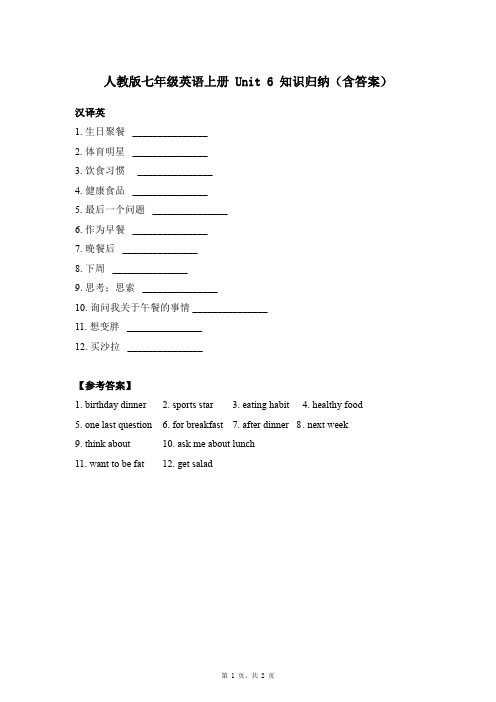
人教版七年级英语上册 Unit 6 知识归纳(含答案)汉译英1.生日聚餐_______________2.体育明星_______________3.饮食习惯_______________4.健康食品_______________5.最后一个问题_______________6.作为早餐_______________7.晚餐后_______________8.下周_______________9.思考;思索_______________10.询问我关于午餐的事情_______________11.想变胖_______________12.买沙拉_______________【参考答案】1. birthday dinner2. sports star3. eating habit4. healthy food5. one last question6. for breakfast7. after dinner8. next week9. think about10. ask me about lunch11. want to be fat12. get salad汉译英1. Cindy认为她妹妹喜欢冰激凌。
____________________________________ 2.那么咱们喝牛奶吧!____________________________________ 3. Jack喜欢什么蔬菜?____________________________________ 4.——咱们早饭吃什么?——水果沙拉怎么样?____________________________________ ____________________________________ 5.——Tom喜欢梨吗?——不,他不喜欢。
____________________________________ ____________________________________ 6.——你们午饭后吃草莓吗?——是的,我们吃。
深圳牛津版英语七年级上Unit6知识点整理及练习
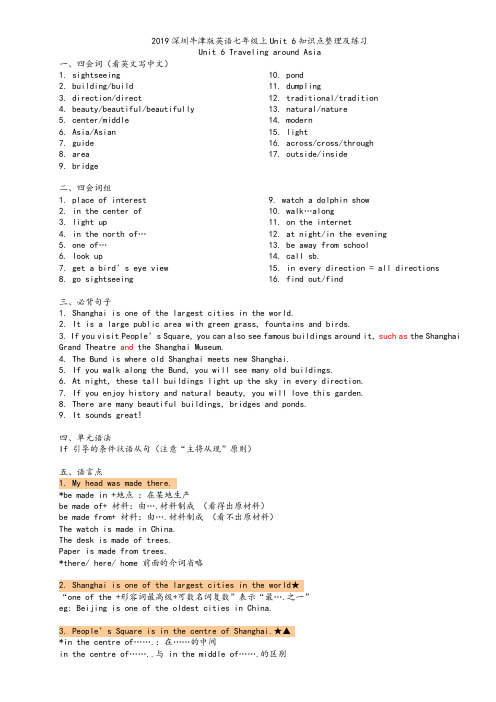
2019深圳牛津版英语七年级上Unit 6知识点整理及练习Unit 6 Traveling around Asia一、四会词(看英文写中文)1. sightseeing2. building/build3. direction/direct4. beauty/beautiful/beautifully5. center/middle6. Asia/Asian7. guide8. area9. bridge 10. pond11. dumpling12. traditional/tradition13. natural/nature14. modern15. light16. across/cross/through17. outside/inside二、四会词组1. place of interest2. in the center of3. light up4. in the north of…5. one of…6. look up7. get a bird’s eye view8. go sightseeing 9. watch a dolphin show10. walk…along11. on the internet12. at night/in the evening13. be away from school14. call sb.15. in every direction = all directions16. find out/find三、必背句子1. Shanghai is one of the largest cities in the world.2. It is a large public area with green grass, fountains and birds.3. If you visit People’s Square, you can also see famous buildings around it, such as the Shanghai Grand Theatre and the Shanghai Museum.4. The Bund is where old Shanghai meets new Shanghai.5. If you walk along the Bund, you will see many old buildings.6. At night, these tall buildings light up the sky in every direction.7. If you enjoy history and natural beauty, you will love this garden.8. There are many beautiful buildings, bridges and ponds.9. It sounds great!四、单元语法If 引导的条件状语从句(注意“主将从现”原则)五、语言点1. My head was made there.*be made in +地点:在某地生产be made of+ 材料:由….材料制成(看得出原材料)be made from+ 材料:由….材料制成(看不出原材料)The watch is made in China.The desk is made of trees.Paper is made from trees.*there/ here/ home 前面的介词省略2. Shanghai is one of the largest cities in the world★“one of the +形容词最高级+可数名词复数”表示“最….之一”eg: Beijing is one of the oldest cities in China.3. People’s Square is in the centre of Shanghai.★▲*in the centre of…….:在……的中间in the centre of……..与 in the middle of…….的区别①centre 常指空间的中心,如圆,球体的“正中心”;学术,工业,商业的中心;eg: the centre of the ballLondon is one of the financial centre of the world.②middle 可用来指时间和活动eg: in the middle of Septemberin the middle of the meeting4. It is a large public area with green grass, fountains and birds.★*public: 公共的 in public 在公共场合* area: n 区域,地区;面积eg: In some areas, the children walk to school.an area of 100 square meters 100 平方米的面积*with: 带有eg: I want to have a house with a beautiful garden.The teacher es into the classroom with a book in his hand.5. The Pudong New area, just across the Huangpu River…..★▲*just: adv 正好,恰好,常用语肯定句eg: It’s just seven o’clock. That’s just what I want.*across: prep 在….对面eg: The Simths live just across the river.史密斯一家就住在河对面。
七年级上Unit6重点复习

七年级上Unit6重点复习
赵丽霞
1.句中划线包括谓语动词划线时,谓语动词要变成do. 如,He watches TV every day. What does he do every day? He is watching TV now. What is he doing now?
2.can,may, must , could, would , might等是情态动词,情态动词不
能单独作谓语,必须在后面加动原,合起来作谓语, can
/may/must/could/would +动原。
如,I can play the guitar. I can’t play the guitar. Can you play the guitar? Yes, I can, No, I can’t.
3.(1)strawberry – strawberries ,
(2) some fruit 一些水果,
(3)You’re right. 你是对的。
(4)That’s right.那是对的。
(5) That’s all right .没关系,不用谢。
(6) some+复数,some +不
可数,
4.(1)some用于肯定句,any 用于否定句和问句中。
原句中有some 变否定句和问句时,要把原句中的some变成any. (2)can, could , would , shall, 等开头的问句中用some, 不用any, 表示语气委婉,希望对方得到肯定回答。
5.许多:a lot of +复数/不可数=lots of +复数/不可数;many+复数;much+不可数名词。
牛津版英语七年级上册Unit6知识点归纳及单元语法+单元测试题(无答案)

牛津版英语七年级上册Unit 6 Travelling around Asia 【短语】travel guide 旅游手册place of interest 名胜in the centre of 在......的中心walk along 沿着……走at night 在晚上in every direction 四面八方refer to 涉及travel around 四处游玩delicious food 美食ride in a cable car 乘坐缆车dolphin show 海豚表演have a wonderful time 玩得尽兴light up 点亮;照亮in the north-west of 在......的西北部get a bird’s-view of 鸟瞰,俯瞰Unit 6 Travelling around AsiaReading基础部分:2. Listen to a girl talking about three cities in Asia.听一个女孩谈论亚洲三个城市。
Asia名词,意为“亚洲”;Asian,“亚洲的,严洲人的;亚洲人”。
East Asia东亚China is in East Asia.中国在东亚。
China is an Asian country. We are Asians.3. Tell your classmate about some places of interest.告诉你同学一些名胜。
place of interest“名胜”There are many places of interest in China.The Great Wall is a place of interest.4. My head was made there.我的头就产于那儿。
The table is made of wood. Wine is made from grapes.Grapes are made into wine. The bike is made in China.5. Shanghai is one of the largest cities in the world.上海是世界上最大的城市之一。
【英语】人教新目标:七年级上册unit6单元基础知识测试题(含答
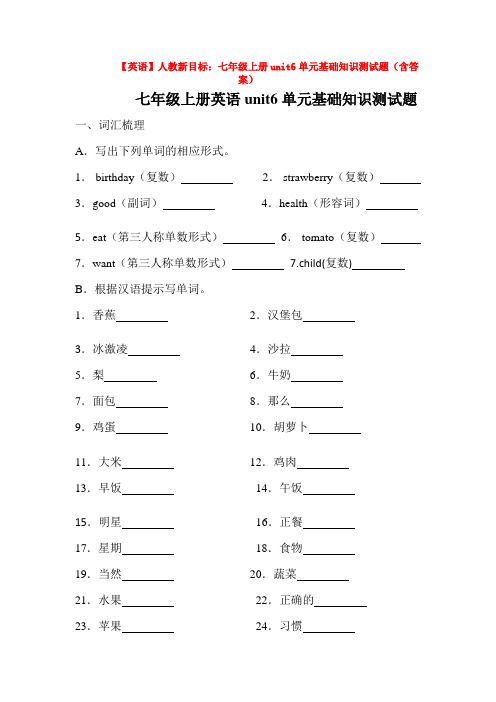
【英语】人教新目标:七年级上册unit6单元基础知识测试题(含答案)七年级上册英语unit6单元基础知识测试题一、词汇梳理A.写出下列单词的相应形式。
1. birthday(复数)2. strawberry(复数)3.good(副词)4.health(形容词)5.eat(第三人称单数形式)6. tomato(复数)7.want(第三人称单数形式)7.child(复数)B.根据汉语提示写单词。
1.香蕉2.汉堡包3.冰激凌4.沙拉5.梨6.牛奶7.面包8.那么9.鸡蛋10.胡萝卜11.大米12.鸡肉13.早饭14.午饭15.明星16.正餐17.星期18.食物19.当然20.蔬菜21.水果22.正确的23.苹果24.习惯25.真正地26.问题27.想要28.变成二、短语梳理1.下周2.考虑3……怎么样4.向某人询问有关…4.饮食习惯三、句子梳理1.你喜欢香蕉吗??2.咱们考虑一下(吃什么)食物吧。
Let's the food.3.那么我们就吃草莓和苹果吧!let's eat and ! 3.她喜欢西红柿吗?she ?5.你早餐吃什么?d o you breakfast? 6.我可不想变胖。
I fat.7.你喜欢什么水果?do you like?8.戴维问排球明星辛迪·史密斯关于她的饮食习惯。
David the volleyball , Cindy Smith her .9.我认为它是健康的。
I .10.最后一个问题,你晚餐后吃冰激凌吗?One last . youeat ?四、考点一、词汇运用。
A)根据句意及汉语或首字母提示完成下列单词。
1. Eating vegetables is a good(习惯).2. He always has a(梨)after lunch.3. I have m and some bread for breakfast.4. - Can I ask you a q, Eric?-Sure.5. -Do you know Yi Jianlian?-Yes, he is a basketball s.B)用括号中所给单词的适当形式填空。
Unit 6-七年级英语上册语法精讲+课内知识拓展+课后精准练习(人教版)
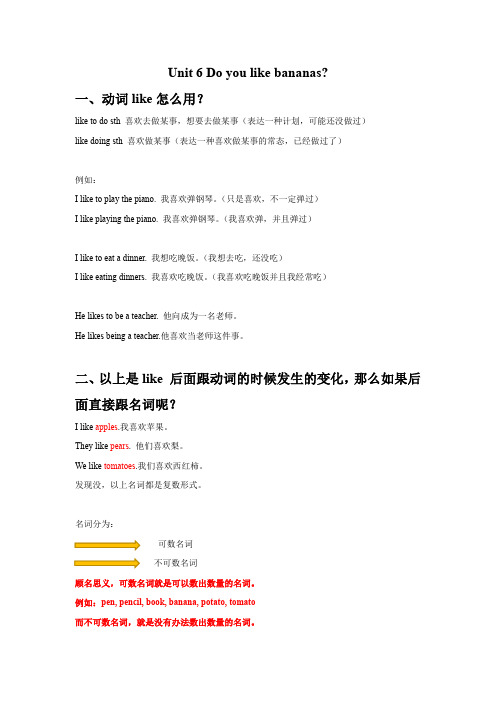
Unit 6 Do you like bananas?一、动词like怎么用?like to do sth 喜欢去做某事,想要去做某事(表达一种计划,可能还没做过)like doing sth 喜欢做某事(表达一种喜欢做某事的常态,已经做过了)例如:I like to play the piano. 我喜欢弹钢琴。
(只是喜欢,不一定弹过)I like playing the piano. 我喜欢弹钢琴。
(我喜欢弹,并且弹过)I like to eat a dinner. 我想吃晚饭。
(我想去吃,还没吃)I like eating dinners. 我喜欢吃晚饭。
(我喜欢吃晚饭并且我经常吃)He likes to be a teacher. 他向成为一名老师。
He likes being a teacher.他喜欢当老师这件事。
二、以上是like 后面跟动词的时候发生的变化,那么如果后面直接跟名词呢?I like apples.我喜欢苹果。
They like pears. 他们喜欢梨。
We like tomatoes.我们喜欢西红柿。
发现没,以上名词都是复数形式。
名词分为:可数名词不可数名词顾名思义,可数名词就是可以数出数量的名词。
例如:pen, pencil, book, banana, potato, tomato而不可数名词,就是没有办法数出数量的名词。
例如:water, milk, bread, juice, money有同学会有疑问,一杯水不是数量吗?一杯水数的是杯子,一块面包数的是块数,一瓶牛奶数的是瓶子,所以可以在不可数名词前面加量词来表示数量。
专项训练:判断以下名词是可数名词还是不可数名词答案:三、可数名词单复数形式变化规则专项训练:请写出以下可数名词的复数形式:答案:适当形式填空1.We have three_____(sheep).2.I have a some_____(money).3.They have two_____(teacher).4.There are many_____(people)live in the city.5.She like collecting(收集)______(leaf).答案解析:1.sheep,单复数同形2.money,不可数名词没有复数形式3.teachers4.people,单复数同形5.leaves四、以f/fe结尾的可数名词变复数的两种变法1.改f/fe 为v再加es小偷之妻生活难(小偷thief,妻子wife,生活life)自己扫叶来做饭(自己self,叶子leaf)忽见一狼躲架后(狼wolf,架子shelf)取刀把它劈两半(刀knife,半half)2.直接加s海湾悬崖有一屋(海湾gulf,悬崖cliff)屋顶首领有信仰(屋顶roof,首领chief,信仰belief)质问农奴偷家财(农奴serf)证据写在手帕上(证据proof,手帕handkerchief)专项训练:请写出以下单词的英语及复数形式答案:五、不可数名词的量词有哪些?专项训练:默写上面的短语六、关于蔬菜的单词拓展专项训练:默写上面的单词翻译下列句子:1.我喜欢吃茄子。
牛津译林版英语七上Unit 6 My clothes my style核心知识讲练(解析版)

Unit 6 My clothes, my style核心考点讲练重点单词(按照单词表,主要讲解涉及用法/注意点/举例的单词)【随堂演练】1.Here ________ a pair of green trousers. Do you like it?A.is B.are C.am D.be【答案】A【详解】句意:这是一条绿色的裤子。
你喜欢吗?考查here be结构。
is第三人称单数;are复数;am通常与I连用;be原形。
Here be意为“这儿有,这儿是”,be动词的形式是就近原则, a pair是单数,be动词应用is。
故选A。
2.—I want a pair of boots for my birthday. What about the red pair?—Not bad. Why not ________?A.try it on B.try on it C.try them on D.try on them【答案】C【详解】句意:——我想要一双靴子作为我的生日礼物。
那双红色的怎么样?——不错。
为什么不试试呢?考查动词短语和代词宾格。
try on“试穿”,动副型短语,宾语为人称代词时,应置于短语中间,排除B和D选项。
上文boots是复数,故用them指代。
故选C。
3.Mom agreed ________ us to visit Sanya. We were excited to hear the news. A.choosing B.to choose C.taking D.to take【答案】D【详解】句意:妈妈同意带我们去三亚玩。
听到这个消息我们很兴奋。
agree to do sth.同意做某事,take sb. to…带领某人去,结合句意可知,答案为D。
4.—Humans should not eat or kill wild animals!—________! Animals are our friends.A.Thanks a lot B.I can’t a gree more C.What a pity D.Don’t mention it 【答案】B【详解】句意:——人类不应该吃或杀死野生动物!——我完全同意。
初一英语上册unit6知识点归纳与练习
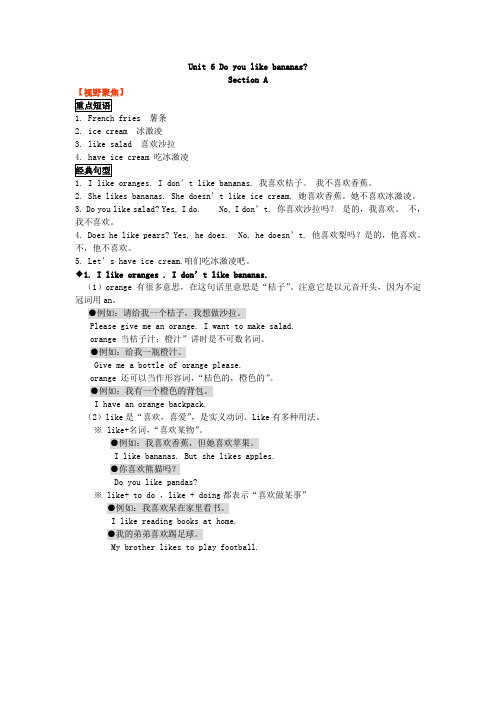
Unit 6 Do you like bananas?Section A【视野聚焦】1. French fries 薯条2. ice cream 冰激凌3. like salad 喜欢沙拉4. have ice cream 吃冰激凌1. I like oranges. I don’t like bananas. 我喜欢桔子。
我不喜欢香蕉。
2. She likes bananas. She doesn’t like ice cream. 她喜欢香蕉。
她不喜欢冰激凌。
3. Do you like salad? Yes, I do. No, I don’t. 你喜欢沙拉吗?是的,我喜欢。
不,我不喜欢。
4. Does he like pears? Yes, he does. No, he doesn’t. 他喜欢梨吗?是的,他喜欢。
不,他不喜欢。
5. Let’s have ice cream.咱们吃冰激凌吧。
◆1. I like oranges . I don’t like bananas.(1)orange 有很多意思,在这句话里意思是“桔子”。
注意它是以元音开头,因为不定冠词用an。
●例如:请给我一个桔子,我想做沙拉。
Please give me an orange. I want to make salad.orange 当桔子汁;橙汁”讲时是不可数名词。
●例如:给我一瓶橙汁。
Give me a bottle of orange please.orange 还可以当作形容词,“桔色的,橙色的”。
●例如:我有一个橙色的背包。
I have an orange backpack.(2)like是“喜欢,喜爱”,是实义动词。
Like有多种用法。
※ like+名词,“喜欢某物”。
●例如:我喜欢香蕉,但她喜欢苹果。
I like bananas. But she likes apples.●你喜欢熊猫吗?Do you like pandas?※ like+ to do ,like + doing都表示“喜欢做某事”●例如:我喜欢呆在家里看书。
人教新目标英语七年级上册unit6单元知识点总结 练习题

人教新目标英语七年级上册unit6 Do you like bananas?重点词汇:banana n.香蕉hamburger n.汉堡包tomato n.西红柿ice-cream n.冰淇淋salad n.沙拉strawberry n.草莓pear n.梨milk n.牛奶bread n.面包birthday n.生日dinner n.正餐week n.周;星期food n.食物sure adv.当然;肯定;一定vegetable n.蔬菜fruit n.水果right n.正确的;适当的apple n.苹果then adv.那么egg n.蛋;鸡蛋carrot n.胡萝卜rice n. 大米;米饭chicken n.鸡肉so conj.那么breakfast n. 早餐;早饭lunch n.午餐star n.明星;星星eat v.吃well adv.好;令人满意地habit n.习惯healthy adj.健康的really adv.真正地question n.问题want v.需要;想要be v.变成fat adj.肥的;肥胖的、重点词组:think about (doing sth) 考虑what/how about doing sth …..怎么样eat well 吃得好ask sb about sth 问某人关于某事ask sb to do sth 要求某人去做某事be healthy 健康的after breakfast/lunch/dinner 早/中/晚饭后want to do sth 想要做某事eating habits 饮食习惯healthy food 健康食品可数名词和不可数名词的区别:用所给词的适当形式填空。
1.These are pens (pen).2.-I want something to eat.-Here is (be) some bread.3.Here are three photos of my family.4.Lin Tao and Lucy are my friends (friend).2. 可数名词复数的构成单元考点解析:1.能掌握以下句型:①—Do you like salad? —Yes, I do. / No, I don’t.②—Does she/he like …? —Yes, she/he does./ No, she/he doesn’t.③—I like …/I don’t like …④—He/She likes …/ He/She doesn’t like …肯定句:①第一人称/第二人称/第三人称复数+ like + 其他②第三人称单数及其他单数名词+ likes + 其他否定句:①第一人称/第二人称/第三人称复数+ don’t + like + 其他②第三人称单数及其他单数名词+ don’t + likes + 其他一般疑问句:①Do + 第一人称/第二人称/第三人称复数+ like +其他?回答:Yes, I/we/you/they do. No, I/we/you/they don’t.②Does + 第三人称单数及其他单数名词+ like + 其他?回答:Yes, he/she/it does. No, he/she/it doesn’t.2. Let’s have ice-cream. 让我们吃冰淇淋吧。
人教版初中英语初一上册Unit 6 知识点总结与练习

Unit 6 Do you like bananas?词句精讲精练词汇精讲1. eat&haveeat 与have 都可以表示“吃”的意思,有时两者可互换。
例如:I eat (have) an apple every day. 我每天吃一个苹果。
They are having (eating) their lunch. 他们在吃中饭。
eat 可用作不及物动词,后面不跟宾语。
但是have没有这个用法。
例如:We eat well at noon. 我们午饭吃的很好。
注意:“吃药”习惯说“have(take) medicine”,不说“eat medicine”。
2. well&good两者都可以表示“好”的意思。
well是副词,用于修饰动词。
例如:Tom speaks Chinese well. 汤姆的汉语说得好。
He sings well. 他唱得好。
good是形容词,用作定语或表语。
例如:She is a good doctor. 她是个好医生。
His pronunciation is very good. 他的发音很好。
well作形容词时,指的是健康状况良好。
例如:He is quite well. 他身体好。
I hope you will be well soon. 我希望你很快好起来。
3. no&notno 表示“不”,修饰可数名词单数时no=not a; 修饰可数名词复数或者不可数名词时no=not any。
例如:I have no book.=I don’t have a book.I have no books. = I don’t have any books.There is no water in the cup.=There isn’t any water in the cup.no 常用来做否定回答,与yes相对应,not不可以。
例如:Do you like bananas? No, I don’t. 不可以说Not, I don’t.not 用于否定句,放在助动词或者be动词后面表示否定,no 不可以。
人教版七年级上册英语Unit6知识点对题练

考点一like 的用法like sth. like doing like to do How do you like…?Would you like …? Would like to do…1. Bill likes bananas, he likes _____, too. A. strawberry B. strawberries C. strawberrys D. strawberres2. I eat some salad, but I ______. A. like it B. like them C. don’t like them D. don’t like it3.我喜欢唱歌。
I like______ _______ songs.4.他喜欢吃汉堡吗?不,他不喜欢。
______ he like______ ________? No, he doesn’t.5.你有多喜欢它?太喜欢了。
_______ _______ you like it? I like it ______ _______.6.—Would you like something to eat? —___________.A.No,I don't B.Yes.I would C.No,thanks D.Give me some7.He would like ___________ some tea.A.to eat B.to drink C.have D.drink8. How do you like your new job, Sam?----It’s so _________ I don’t like it at all.A.boringB. interestingC. excitingD. relaxing考点二have 的用法有(区分there be)上课吃喝玩乐1. 我有个快乐的家。
_________________2. 我们班有好多有趣的书。
- 1、下载文档前请自行甄别文档内容的完整性,平台不提供额外的编辑、内容补充、找答案等附加服务。
- 2、"仅部分预览"的文档,不可在线预览部分如存在完整性等问题,可反馈申请退款(可完整预览的文档不适用该条件!)。
- 3、如文档侵犯您的权益,请联系客服反馈,我们会尽快为您处理(人工客服工作时间:9:00-18:30)。
七年级上英语U6基础知识点练习I. Choose the best answer. (选择正确的答案)
A. and
B. or
C. with
D. but
A. but
B. or
C. then
D. with
A. more interesting
B. much interesting
C. busy
D. much busy
A. took
B. takes
C. costs
D. spends
— Autumn.
A. the forth
B. four
C. fourth
D. the fourth
A. With
B. from
C. to
D. about
A. So
B. For
C. Because
D. But
A. hear
B. listen to
C. listen
D. find
A. In
B. on
C. at
D.to
II. Rewrite the sentences as required. (按要求改写句子)
1Ben usually does his homework before supper. (改为一般疑问
句)
Ben usually ____________ his homework
before supper?
2He has already learnt to drive a car. (改为否定句)
He_______________ learnt to drive a car ______________ .
3Alice likes orange juice better than cola. (保持原句意思)
Alice orange juice_____________ cola.
does Peter go to visit his grandma?
III. Read and choose the correct sentence in each pair. (阅读后从各组中选择正确的一项)
The Cheap Apartment
Jean Herman lives in an apartment in New York City. Jean's apartment is small, but she likes it. The apartment is cheap; Jean pays only $ 200 a month.
Jean's apartment was in an old building. One day a big company bought the old building. The company wanted to tear down (拆除) the old building and build a skyscraper (摩天大楼). Some people from the company visited Jean. 'We're going to tear down this building,' the people told Jean. 'So, you have to move. Here is a check (支票) for $ 50,000. You can find a new apartment — a bigger and more beautiful apartment.'
‘I don't want a new apartment,’ Jean said. 'I like this apartment. I'm not going to move.’ Jean didn't take the check.
The next day the people came back with a check for $ 100,000. Jean didn't take the check. 'I'm not going to move,' she said.
Every day the people came back with more money. Jean didn't take their checks.
Finally, the people come with a check for $ 750,000. ' Please take the money and move,’the people said.
'I'm not going to move,' Jean says. 'Not for $ 750,000. Not for a million dollars. Not for ten million dollars. I like this apartment. It's my home.’
Jean didn't move, and the company didn't tear down the building. The company built the skyscraper behind the old building.
And so, on East 60th Street in New York City, there is an unusual skyscraper. The skyscraper has an old building in front of it. Jean Herman lives alone in the old building. Her apartment is small, but Jean likes it. The apartment is cheap; Jean pays only $200 a month.
1. A) Jean's apartment is large and expensive.
B) Jean's apartment is small and cheap.
2. A) A big company wanted to tear down the old building and build a restaurant.
B) A big company wanted to tear down the old building and build a skyscraper.
3. A) Jean didn't take the check for $ 750,000.
B) Jean took the check for $ 750,000.
4. A) Jean didn't want to move because she
liked her apartment.
B) Jean didn't want to move because she
liked New York City.
5. A) The company builds a skyscraper behind the old building.
B) The company builds a skyscraper in front of the old building.
IV. Fill in the blanks with proper words to complete the passage. (根据首字母提示,用适当的单词完成下面的短文)
Have you (1) e seen a painting that seems to tell a story? Norman Rockwell's pictures can do that. Each one tells a (2) d story. Many of his pictures show things you have probably (3) d . One painting shows a boy at the doctor's office. Another picture shows boys and girls at school. There is even one that a dog followed a family into a church.
Norman Rockwell began painting when he was a young boy. He used his pictures to (4) m his friends laugh. He hoped everyone liked his pictures.
help you remember even your old days with a smile.
参考答案
I.1B2A3A 4B5D6B7C 8A 9 A
II.1.Does ... do 2.hasn't ... yet 3.prefers ... to 4.How often III.1B2B3A4A 5A
IV.1 ever 2 different 3 done 4 make 5 seen。
